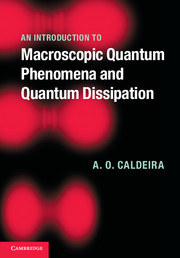Book contents
- Frontmatter
- Dedication
- Contents
- Preface
- Acknowledgments
- 1 Introduction
- 2 Elements of magnetism
- 3 Elements of superconductivity
- 4 Brownian motion
- 5 Models for quantum dissipation
- 6 Implementation of the propagator approach
- 7 The damped harmonic oscillator
- 8 Dissipative quantum tunneling
- 9 Dissipative coherent tunneling
- 10 Outlook
- Appendix A Path integrals, the quantum mechanical propagator, and density operators
- Appendix B The Markovian master equation
- Appendix C Coherent-state representation
- Appendix D Euclidean methods
- References
- Index
1 - Introduction
Published online by Cambridge University Press: 05 April 2014
- Frontmatter
- Dedication
- Contents
- Preface
- Acknowledgments
- 1 Introduction
- 2 Elements of magnetism
- 3 Elements of superconductivity
- 4 Brownian motion
- 5 Models for quantum dissipation
- 6 Implementation of the propagator approach
- 7 The damped harmonic oscillator
- 8 Dissipative quantum tunneling
- 9 Dissipative coherent tunneling
- 10 Outlook
- Appendix A Path integrals, the quantum mechanical propagator, and density operators
- Appendix B The Markovian master equation
- Appendix C Coherent-state representation
- Appendix D Euclidean methods
- References
- Index
Summary
Since its very beginning, quantum mechanics has been developed to deal with systems on the atomic or sub-atomic scale. For many decades, there has been no reason to think about its application to macroscopic systems. Actually, macroscopic objects have even been used to show how bizarre quantum effects would appear if quantum mechanics were applied beyond its original realm. This is, for example, the essence of the so-called Schrödinger cat paradox (Schrödinger, 1935). How-ever, due to recent advances in the design of systems on the meso- and nanoscopic scales, as well as in cryogenic techniques, this situation has changed drastically. It is now quite natural to ask whether a specific quantum effect, collectively involving a macroscopic number of particles, could occur in these systems.
In this book it is our intention to address the quantum mechanical effects that take place in properly chosen or built “macroscopic” systems. Starting from a very naïve point of view, we could always ask what happens to systems whose classical dynamics can be described by equations of motion equivalent to those of particles (or fields) in a given potential (or potential energy density). These can be represented by a generalized “coordinate” φ(r, t) which could either describe a field variable or a “point particle” if it is not position dependent, φ(r, t) = φ(t).
- Type
- Chapter
- Information
- Publisher: Cambridge University PressPrint publication year: 2014



